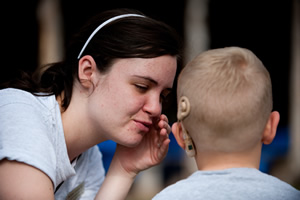
The CHildren & Infant Listening Laboratory (CHILL) group explores how infants, children, and adolescents with hearing loss wearing cochlear implants learn to communicate with others, and how communication affects how they feel about themselves. Research in the CHILL group focuses on topics such as:
- The auditory, demographic, and familial factors that affect how often infants and children wear their devices
- The effect of auditory status on visual processing of emotional facial cues
- The audiological factors affecting speech intelligibility of children with hearing loss
- The role of music experiences in the lives of individuals with hearing loss
- Prevalence and types of peer victimization in samples of adolescents with HL
Previous research efforts have focused on:
- The effect of device experience on how infants and toddlers with hearing loss learn to discriminate speech sounds
- The tradeoff between spectral resolution and age on infant speech discrimination using cochlear implant simulations
- The influence of age and personality on how infants and toddlers wearing cochlear implants develop vocabulary
- The impact of personality, social skills, and hearing loss characteristics on quality of life in children and adolescents with hearing loss
- Standardization of pediatric speech testing protocols

Recent Publications
Wiseman, K. B., Warner-Czyz, A. D., Kwon, S., Fiorentino, K., & Sweeney, M. (2021). Relationship between daily device use and early communication outcomes in young children with cochlear implants. Ear & Hearing, Published Ahead of Print. doi: 10.1097/AUD.0000000000000999.
Wiseman, K. B., Warner-Czyz, A. D., Nelson, J. A. (2021). Stress in parents of school-age children and adolescents with cochlear implants. Journal of Deaf Studies and Deaf Education, enaa042.
Warner-Czyz, A. D. (2019) Current state of knowledge: Quality of life in adolescents with hearing loss using cochlear implants. Invited manuscript as part of D. Sorkin’s Proceedings of the annual conference of the American cochlear implant alliance. Cochlear Implants International, 20 (Supplement 1), 1-17.
Warner-Czyz, A. D., Evans, D., Turkstra, L., Scheppele, M., Song, C., & Evans, J. L. (2019). Effect of auditory status on visual emotion recognition in adolescents. Cochlear Implants International 20(3): 127-137.
Warner-Czyz, A. D., Loy, B.A., Pourchot, H., White, T., & Cokely, E. (2018). Effect of Hearing Loss on Peer Victimization in School-Age Children. Exceptional Children, 84(3), 280-297.
Wiseman, K. B. & Warner-Czyz, A. D. (2018). Inconsistent device use in pediatric cochlear implant users: Prevalence and risk factors. Cochlear Implants International, 19(3), 131-41.
Houston, D. M. & Warner-Czyz, A. D. (2018). Speech perception and auditory development in infants with and without hearing loss. In A. Bar-On & D. Ravid (Eds.), Handbook of Communication Disorders. Theoretical, Empirical, and Applied Linguistics Perspectives (43-62). Berlin, Boston: De Gruyter Mouton.
Geers, A. E., Mitchell, C. M., Warner-Czyz, A. D., Eisenberg, L. S., Wang, N.-Y., and the Childhood Development after Cochlear Implantation Investigative Team. (2017). Impact of early sign language exposure on benefits realized from cochlear implantation. Pediatrics 140(1): 1-9.
